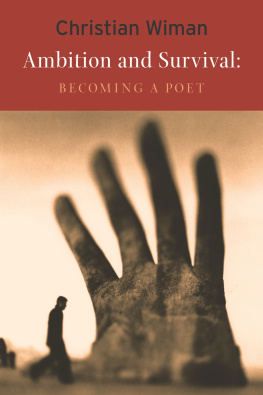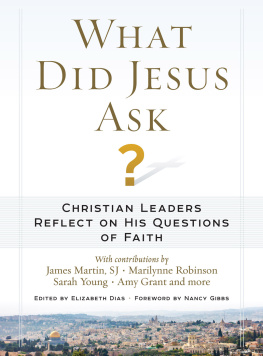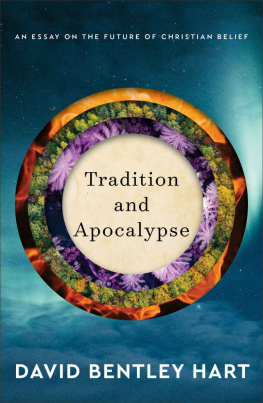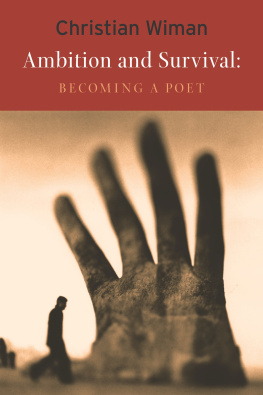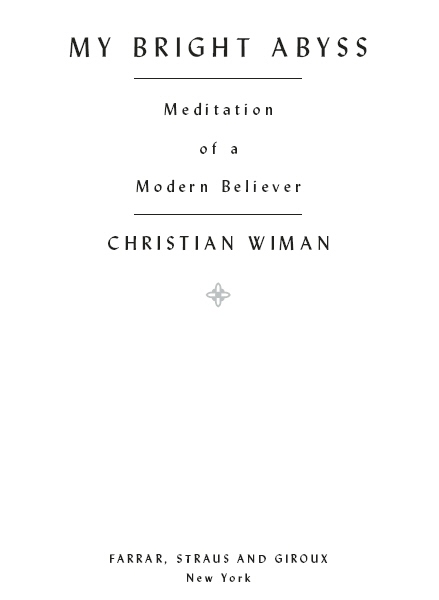
The author and publisher have provided this e-book to you for your personal use only. You may not make this e-book publicly available in any way. Copyright infringement is against the law. If you believe the copy of this e-book you are reading infringes on the authors copyright, please notify the publisher at: us.macmillanusa.com/piracy.
For D. Forever.
CONTENTS
PREFACE
Seven years ago I wrote a short essay called Love Bade Me Welcome. It was published (with a different title) in a relatively small magazine, and it generated what was, in my experience, a lot of responses. It was later, though, on the internet, in anthologies, in church services and reading groups, that the essay acquired its second life, and I still get the occasional letter from someone who has come across it. These letters are diverse, intense, intelligent, and often from people who have no contact with the literary world whatsoever. They are the most gratifying reactions to my work that I have ever received.
And the essay itself? It was about despair: losing the ability to write, falling in love, receiving a diagnosis of an incurable cancer, having my heart ripped apart by what, slowly and in spite of all my modern secular instincts, I learned to call God. It was my entire existence crammed into eight pages. The essay detailed a radical change in my life, and then it seemedor the reaction seemedto demand a further one.
I am a poet. To be a poet in contemporary America is to be accustomed to, let us say, muted reactions to ones work. It is alsoand this, I suspect, is not limited to Americato learn to write without much concern for audience, not because you dont want your poems to be read, but because in order for poems to honor the voice that creates them, a voice that, as even the most secular poets acknowledge, seems to come from somewhere elsein order, that is, for the poems to be poemsyou have to acquire a monkish devotion to their source, and to the silence within you that enables that source to speak.
Ill never give up poetryI wouldnt even know howbut all those letters in response to Love Bade Me Welcome made me more aware of an audience and my own need for dialogue. There is an enormous contingent of thoughtful people in this country who, though they are frustrated with the language and forms of contemporary American religion, nevertheless feel that burn of being that drives us out of ourselves, that insistent, persistent gravity of the ghost called God. I wanted to try to speak to these people more directly. I wanted to write a book that might help someone who is at once as confused and certain about the source of life and consciousness as I am.
Initially I thought this book wouldnt even mention my illness. I told myself that I wanted to avoid any appearance of special pleading, wanted to strip away the personal and get to ulterior truths. In fact, I think what I most wanted was escape and relief. During the years that I have worked on this bookwhich is very much a mosaic, not a continuous argument or narrativemy cancer has waxed and waned, my prospects dimmed and brightened, but every act and thought have occurred in that shadow. The form of the book reflects this, not simply the fragmentary and episodic quality, but also the accelerating urgency of the last chapters. I feel quite certain that I would be writing about matters of faith had I never gotten sickthe obsession is everywhere in my earlier workbut I also suspect that without the impetus of serious illness, my work would not have taken the particular form that it has. It seemed dishonest to avoid this dynamic.
When my life broke open seven years ago, I knew very well that I believed in something. Exactly what I believed, however, was considerably less clear. So I set out to answer that question, though I have come to realize that the real questionthe real difficultyis how, not what. How do you answer that burn of being? What might it mean for your lifeand for your deathto acknowledge that insistent, persistent ghost?
MY BRIGHT ABYSS
My God my bright abyss
into which all my longing will not go
once more I come to the edge of all I know
and believing nothing believe in this:
* * *
And there the poem ends. Or fails, rather, for in the several years since I first wrote that stanza I have been trying to feel my wayto will my wayinto its ending. Poems in general are not especially susceptible to the will, but this one, for obvious reasons, has proved particularly intractable. As if it werent hard enough to articulate ones belief, I seem to have wanted to distill it into a single stanza. Still, that is the way I have usually known my own mind, feeling through the sounds of words to the forms they make, and through the forms they make to the forms of life that are beyond them. And I have always believed in that beyond, even during the long years when I would not acknowledge God. I have expected something similar here. I have wanted some image to open for me, to both solidify my wavering faith and ramify beyond it, to say more than I can say.
* * *
In truth, though, what I crave at this point in my life is to speak more clearly what it is that I believe. It is not that I am tired of poetic truth, or that I feel it to be somehow weaker or less true than reason. The opposite is the case. Inspiration is to thought what grace is to faith: intrusive, transcendent, transformative, but also evanescent and, all too often, anomalous. A poem can leave its maker at once more deeply seized by existence and, in a profound way, alienated from it, for as the act of making endsas the world that seemed to overbrim its boundaries becomes, once more, merely the worldit can be very difficult to retain any faith in that original moment of inspiration at all. The memory of that momentary blaze, in fact, and the art that issued from it, can become a reproach to the fireless life in which you find yourself most of the time. Grace is no different. (Artistic inspiration is sometimes an act of grace, though by no means always.) To experience grace is one thing; to integrate it into your life is quite another. What I crave now is that integration, some speech that is true to the transcendent nature of grace yet adequate to the hard reality in which daily faith operates. I crave, I suppose, the poetry and the prose of knowing.
* * *
When I was young, twelve years old or so, I had an experience one morning in church. I put the word in quotes because, though the culture in which I was raised possessed definite language to explain what happened to me (I was filled with the Holy Spirit, I was saved), I no longer find that language accurate or helpful when thinking about how God manifests himselfor herself, or Godself, or whatever hopeless reflexive pronoun you want to usein reality and individual lives. Also, I dont really remember the event. I remember that it happened, but its in the half-wakeful, sedated way a man remembers a minor surgery. I remember being the subject of much adult awe and approbation, but even then the child those adults described, weeping and shaking and curled up tight in the church basement, was a stranger to me.
I grew up in a flat little sandblasted town in West Texas: pumpjacks and pickup trucks, cotton like grounded clouds, a dying strip, a lively dump, and above it all a huge blue and boundless void I never really noticed until I left, when it began to expand alarmingly inside of me. To call the place predominantly Christian is like calling the Sahara predominantly sand: I never met an actual unbeliever until my first day of college in Virginia, when a dauntingly hip prep-schooled freshman announced his atheism as casually as a culinary preference. Though I would presently embrace my own brand of bookish atheismwith, alas, a converts fervorjust then I could not have been more shocked had that boy begun swiveling his head around and growling Aramaic.
Next page

